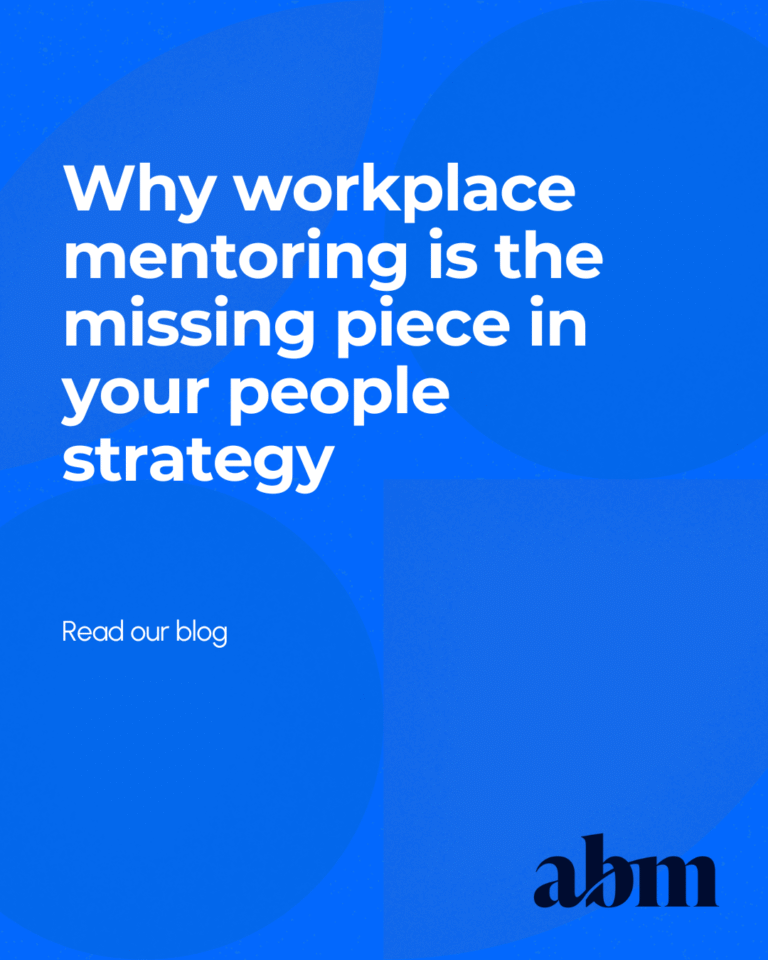Across sectors, HR and People leaders are rethinking their approach to talent development. The challenges are familiar: rising recruitment costs, skills shortages, disengaged managers, and increasingly complex expectations from employees. Traditional learning and development tools, while still important, are no longer enough on their own.
So, what’s missing?
For many organisations, the missing piece is structured workplace mentoring — a proven, cost-effective and highly scalable way to drive performance, build leadership capability, and increase retention.
Mentoring is no longer just a “nice to have”
Workplace mentoring has historically been seen as informal, lightly managed, or even voluntary. And while those “grassroots” programmes often bring value, they rarely scale, and they’re almost never aligned to strategic goals.
Today, mentoring is entering a new phase.
The Association of Business Mentors’ 2025 research with over 250 HR and People Directors shows just how significant its impact has become:
- 70% strongly agreed that mentoring and coaching programmes improve overall business performance
- 66% reported a positive impact on employee retention and talent attraction
- 63% said programmes had supported career progression
- 61% agreed they had improved employee wellbeing
- 77% of organisations are already using AI to support mentoring and coaching — from matching mentors/mentees to creating personalised learning plans and tracking progress
These aren’t marginal gains. Mentoring is emerging as a serious performance and wellbeing tool, something organisations can no longer afford to overlook.
Why mentoring makes a strategic difference
A well-designed mentoring programme strengthens your people strategy in several ways:
1. Retention and engagement
When employees feel supported, seen, and invested in, they stay. Mentoring provides a sense of belonging, purpose, and growth especially during the critical first year of employment or transition into leadership roles.
2. Leadership development
Not all learning happens in a classroom. Mentoring accelerates real-world learning through trusted relationships. It helps future leaders learn how to think strategically, manage people, and navigate complex workplace dynamics.
3. Cultural cohesion
Mentoring strengthens cross-functional and intergenerational relationships, reducing silos and improving collaboration. It can also be tailored to support DEI&B goals such as reverse mentoring or mentoring circles.
4. Cost efficiency
Rather than defaulting to costly external hires or consultancy, mentoring allows you to develop internal talent. It reduces recruitment spend and shortens time to productivity without compromising quality.
What’s holding mentoring programmes back?
If mentoring is so effective, why isn’t it more widely adopted, especially in organisations with ambitious people strategies?
Our research uncovered the top three barriers:
- 47% said lack of time or availability
- 39% cited difficulty in matching mentors and mentees
- 38% highlighted limited budget or resources
These challenges mirror what we see on the ground:
1. It’s still seen as informal
Mentoring is often perceived as something that happens organically, rather than something that needs structure, support and strategic oversight.
2. Lack of structure and accountability
Without clear goals, well-matched pairings, preparation for mentors and mentees, and ongoing tracking, mentoring loses momentum.
3. No link to organisational strategy
When mentoring isn’t tied to business objectives like succession planning, DEI&B goals, retention, or leadership development, it becomes isolated from the wider people agenda.
4. Measurement gaps
Perhaps the biggest blocker: no data. Without evidence of impact, mentoring remains undervalued. Leaders want to see outcomes on retention, performance, engagement — and informal mentoring rarely provides those metrics.
The result?
Mentoring programmes get launched with good intention and quietly fizzle out. Meanwhile, the opportunity to build capability, confidence and connection across your workforce is missed.
What does a strategic approach to mentoring look like?
Strategic mentoring is intentional, measurable, and fully embedded in your people strategy.
At ABM, we help organisations build that strategic framework through:
- The Coaching & Mentoring Culture Healthcheck
- Executive and leadership mentoring
- Accredited training for internal coaches and mentors (e.g. ILM Level 5/7)
- Support for systems and processes (matching, supervision, feedback)
- Workplace mentoring programme design and delivery
- Accreditation that validates your cultural maturity
This full-spectrum approach creates mentoring ecosystems rather than just isolated relationships.
Don’t let mentoring be the missing piece
If you’re serious about people strategy, mentoring needs to be part of the puzzle.
It’s cost-effective, proven, and deeply human. It supports wellbeing while delivering measurable ROI. And it’s one of the few tools that bridges leadership development, talent retention, and organisational culture.
No wonder 98% of HR and People Directors in our research said they would recommend establishing a mentoring programme to other organisations.
So the real question isn’t “Should we do mentoring?”
It’s: “How can we do mentoring well?”
Whether you’re building from scratch or want to take an existing programme to the next level, ABM can help.
Contact our head of workplace services pete.wortley@associationofbusinessmentors.org
📄 Download our research report to learn more



